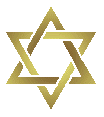 |
 |
 |
 |
 |
 |
 |
 |
 |
 |
 |
 |
 |
 |
 |
 |
 |
 |
|
|
JEWISHSCRIPTURES
AND
RELIGIOUS LEADERS |
|
|
|
 |
|
|
|
What are the Jewish Scriptures? |
|
|
|
|
|
Jews do not have an Old and New Testament. What Christians refer to as the New Testament is not included in the Jewish Bible, and what Christians call the Old Testament is known to Jews as the Written Torah. Torah, however, is not confined to the written books of the Hewbrew Scriptures, but also includes a tradition, or Oral Torah, which helps to explain the correct way to interpret the Scriptures and live out the mitzvot given by G-d. More traditional Jews believe that G-d gave not only the Written but also the Oral Torah to Moses at Mount Sinai. The Oral Torah is composed of the mishnah, commentaries on Scripture compiled around 100 AD, and the gemara, further commentaries elaborating on the mishnah over the next few centuries. The mishnah and gemara together are known as the Talmud. In addition to the Written Torah and the Talmud, there are also midrashim-- stories that explain incidents in the Bible.
There is also a tradition in Judaism that focuses on exploring mysticism and spirituality in depth. This tradition is known as Kabbalah, and its main text is called the Zohar. The Zohar is traditionally forbidden for anyone under the age of forty, because it is very easy to misinterpret it unless a person is highly educated in more fundamental principles. |
|
|
|
|
|
 |
|
|
|
What kind of religious leaders are there in Judaism? |
|
|
|
|
|
-Rabbi: A rabbi is a teacher who is highly educated in Jewish law, and therefore able to answer any questions that may arise. A rabbi is not a priest, and does not have any more authority than any other adult Jewish male when it comes to performing rituals. Rabbis are looked to as leaders because of their knowledge of halakhah.
-Kohein: A kohein is a priest descendant from Aaron. Aaron and his descendants were chosen by G-d to perform certain rituals and tasks associated with the Temple. After the Temple was destroyed in 70 AD, however, the role of the kohanim diminished significantly, and rabbis took on more of the leadership.
-Tzaddik: A traditional, mystical movement of Judaism, known as Chasidism, is led by a tzaddik. Tzaddik means "righeous one", and the chasidim look to their tzaddik for guidance in all aspects of life. A tzaddik may also be called a rebbi, and in the community, his decision is final. Oftentimes, the tzaddikate is hereditary, with son following father in the role. |
|
|
|
 |
|
|
|
|
|


